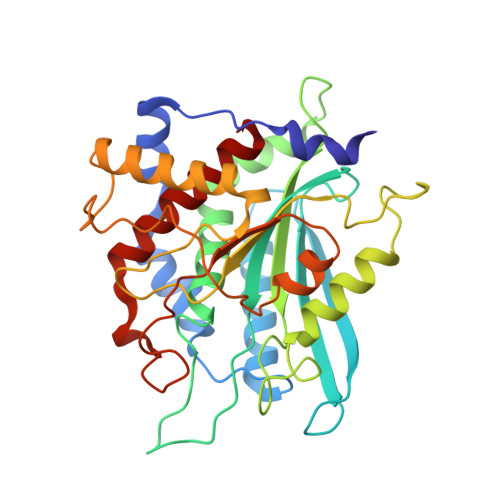Piperidine-4-carboxamide as a new scaffold for designing secretory glutaminyl cyclase inhibitors.
Dileep, K.V., Sakai, N., Ihara, K., Kato-Murayama, M., Nakata, A., Ito, A., Sivaraman, D.M., Shin, J.W., Yoshida, M., Shirouzu, M., Zhang, K.Y.J.(2020) Int J Biol Macromol 170: 415-423
- PubMed: 33373636
- DOI: https://doi.org/10.1016/j.ijbiomac.2020.12.118
- Primary Citation of Related Structures:
7COZ, 7CP0 - PubMed Abstract:
Alzheimer's disease (AD), a common chronic neurodegenerative disease, has become a major public health concern. Despite years of research, therapeutics for AD are limited. Overexpression of secretory glutaminyl cyclase (sQC) in AD brain leads to the formation of a highly neurotoxic pyroglutamate variant of amyloid beta, pGlu-Aβ, which acts as a potential seed for the aggregation of full length Aβ. Preventing the formation of pGlu-Aβ through inhibition of sQC has become an attractive disease-modifying therapy in AD. In this current study, through a pharmacophore assisted high throughput virtual screening, we report a novel sQC inhibitor (Cpd-41) with a piperidine-4-carboxamide moiety (IC 50 = 34 μM). Systematic molecular docking, MD simulations and X-ray crystallographic analysis provided atomistic details of the binding of Cpd-41 in the active site of sQC. The unique mode of binding and moderate toxicity of Cpd-41 make this molecule an attractive candidate for designing high affinity sQC inhibitors.
- Laboratory for Structural Bioinformatics, Center for Biosystems Dynamics Research, RIKEN, 1-7-22 Suehiro, Tsurumi, Yokohama, Kanagawa 230-0045, Japan.
Organizational Affiliation:



















